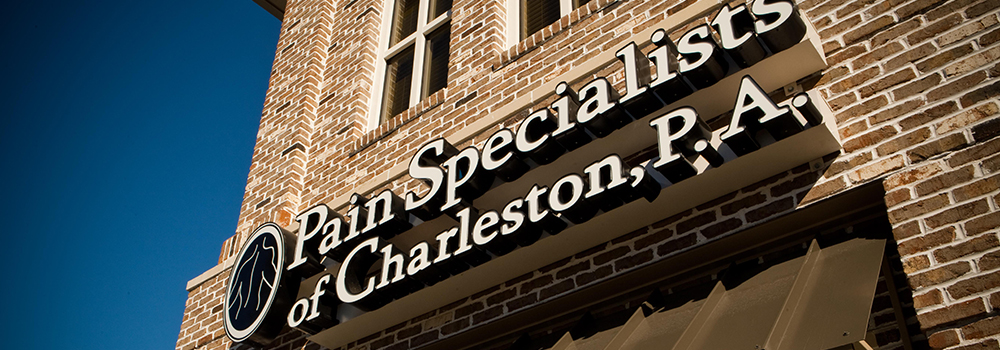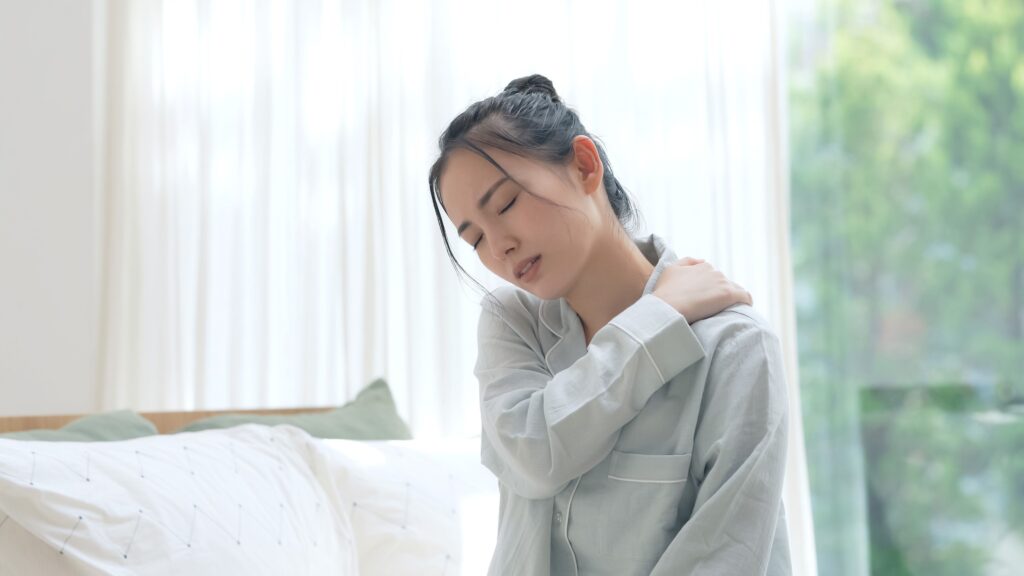Let me paint you a picture: The sun is peaking in through your blinds, the birds are just starting to sing their tunes, and – after your extra five-minute alarm has been snoozed – you roll over to meet the day head-on when an intense burning pain in your shoulder almost knocks the breath out of you.
Shoulder pain can potentially hold you back from a good night’s sleep or your morning cup of coffee – and it is a problem many side sleepers face. But is sleeping on your side really what’s to blame for your shoulder pain? And if not, when should you visit a doctor?
You have questions and we have the answers! Keep reading to learn more about shoulder pain and if side sleeping is really to blame, only at Pain Specialists of Charleston!
What Causes Shoulder Pain?
We’ve all heard how important posture is regarding pain or discomfort – from lifting weights at the gym to sitting at your desk. Just as your posture plays a crucial role in the health of your body while awake, it can also cause various aches and pains while you sleep.
On average, we spend between six to eight hours asleep. For side sleepers, a majority of the upper body weight is resting on the shoulder and arm. This prolonged pressure can result in several shoulder conditions, including:
- Rotator cuff injury: Occurs when the rotator cuff’s tendons are inflamed or torn. Damage to the rotator cuff could result in swelling, general shoulder pain, and further inflammation.
- Shoulder bursitis: Fluid-filled sacs, or bursae, help cushion the tissue surrounding the joints. Shoulder bursitis is one of the most common areas for bursitis to develop and can result in redness, inflammation, and stiffness in the shoulder, along with increased pain from movement and pressure.
- Osteoarthritis: Occurs when the cartilage in the shoulder begins to break down. While it occurs naturally with age, it can also develop over time from a previous trauma or injury. Osteoarthritis in the shoulder can reduce the range of motion and, in some cases, cause clicking or grinding sounds within the shoulder.
- Shoulder impingement: Tissue around the rotator cuff begins to rub against nearby bone and tissue. Symptoms include pain in the outer part or top of the shoulder and general shoulder weakness.
- Frozen shoulder: The gradual loss of active and passive motion in the shoulder. It occurs due to the thickening of the shoulder joint capsule, limiting the range of motion over time.
- Bicep tendonitis: Typically, the result of long-term overuse and deterioration of the tendon in the biceps. Classified as an overuse or repetitive stress injury, it can result in shoulder pain at night and cause sharp arm pain.
Waking Up With Pain in Your Shoulder After Sleeping (Should I Change the Way I Sleep?)
Finding your ideal sleep position is like discovering your favorite coffee shop – everything feels just right. However, what may feel right when you shut your eyes at night may lead to sudden shoulder pain without injury in the early morning.
Unfortunately, sometimes the only thing you can do is adopt a better sleeping position. *Cue the tears*
What is that prime sleeping position, might you ask? Well, let’s just say that you may be spending some time learning the intricacies of your bedroom ceiling.
Sleeping on your back can be a difficult task for some, but our job as the leading pain management clinic near you is to help you find ways to alleviate your pain. Here are some tips and tricks to train yourself to sleep on your back:
- Find the right mattress that supports sleeping on your back
- Toss out the too-flat pillows you’ve been holding onto and invest in a good pillow for neck support
- Add an extra pillow under your knees and lower back (the more, the merrier!)
- Don’t be shy! If you have the room, spread out a bit and take up full use of your bed space
Sleeping on your back not only can help with shoulder pain but also has the potential to relieve tension headaches and sinus buildup. Keep in mind, that there is no one-size-fits-all to shoulder pain relief. Talk to a pain management physician to discuss what’s best for you and to rule out any underlying pain conditions that could be the cause of your shoulder pain.
Solutions to Shoulder Pain From Sleeping on Your Side
While your sleep position may be the reason for your morning pain, you unfortunately still have to go about your daily routine with an intense ache in your shoulder. While there are at-home methods to be considered, we recommend addressing your shoulder pain with one of our interventional pain management specialists.
Some of the most popular at-home shoulder pain treatments include:
- Shoulder exercises: One of the key methods we use for pain management is physical therapy and medical massage. By targeting your area of pain, our physical therapists can help you increase the range of motion and alleviate pain with specific exercises and rotator cuff strengthening.
- Heat and ice packs: Depending on your shoulder symptoms, applying heat and ice can be an effective strategy for improving pain. If you have osteoarthritis, heat can help relax the muscles and joints. If you are experiencing shoulder strain, on the other hand, an ice pack can help alleviate swelling and minimize the pain.
Discuss options for pain management near you with one of our physicians. We can help you get to the root cause of your pain and provide the tools to get you back to a life without pain!
When Should I Visit a Pain Management Physician?
Whether you are suffering from pain in your shoulder due to side sleeping or a past shoulder injury, your daily routine should not be hindered by pain or inability. While at-home treatments may help improve symptoms, shoulder pain that lasts longer than a few weeks or increases in severity may mean it’s time to seek medical help.
Visit a clinic for pain management in Charleston, SC if you are experiencing:
- Pain that steadily worsens
- Grinding, clicking, or popping noises in the shoulder
- Prior shoulder injury
- Inability to go about your daily routine
- Trouble sleeping
- Visible growth or swollen mass on the shoulder
Get a Better Night’s Sleep with the Help of Pain Specialists of Charleston

At Pain Specialists of Charleston, we believe that everyone has the right to live a life free of pain! From interventional pain management treatments to the latest research, our board-certified physicians believe in helping you say goodbye to pain without habit-forming drugs or surgery.
Contact us today to schedule an appointment and start making your way back to a good night’s sleep – and a good morning free of pain!
Request Appointment | Contact Us | Meet Pain Doctors | Visit Us
Additional Helpful Articles:
What Should I Expect During My First Pain Management Appointment?
Interventional Pain Management: Everything You Need to Know
What Does a Pain Management Physician Do?
Does Cracking Your Knuckles Cause Arthritis?
What’s the Best Leg Pain Treatment Without Surgery?
When Should I See a Doctor for Runner’s Knee?
What are the Reasons for Random Pains in My Buttocks?
How Can I Get Immediate Relief for Sciatic Pain?
Get to Know Pain Management Physicians:
Our Services:
Diagnosis | Treatment | Interventional Pain Management | TRICARE | Wellness | Clinical Trials | Worker’s Compensation | Neurology | Imaging/ MRI
Published June 2024

